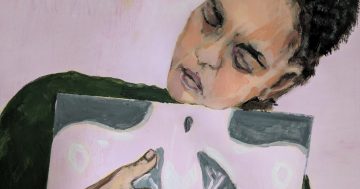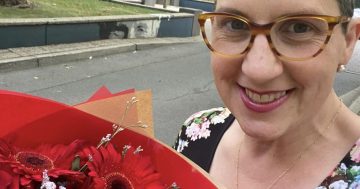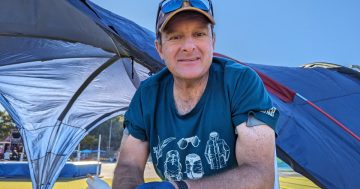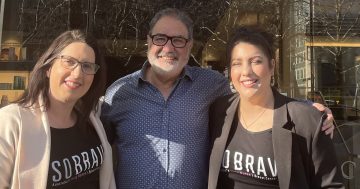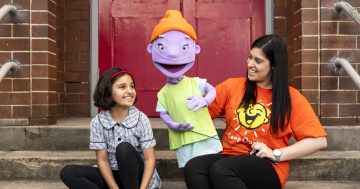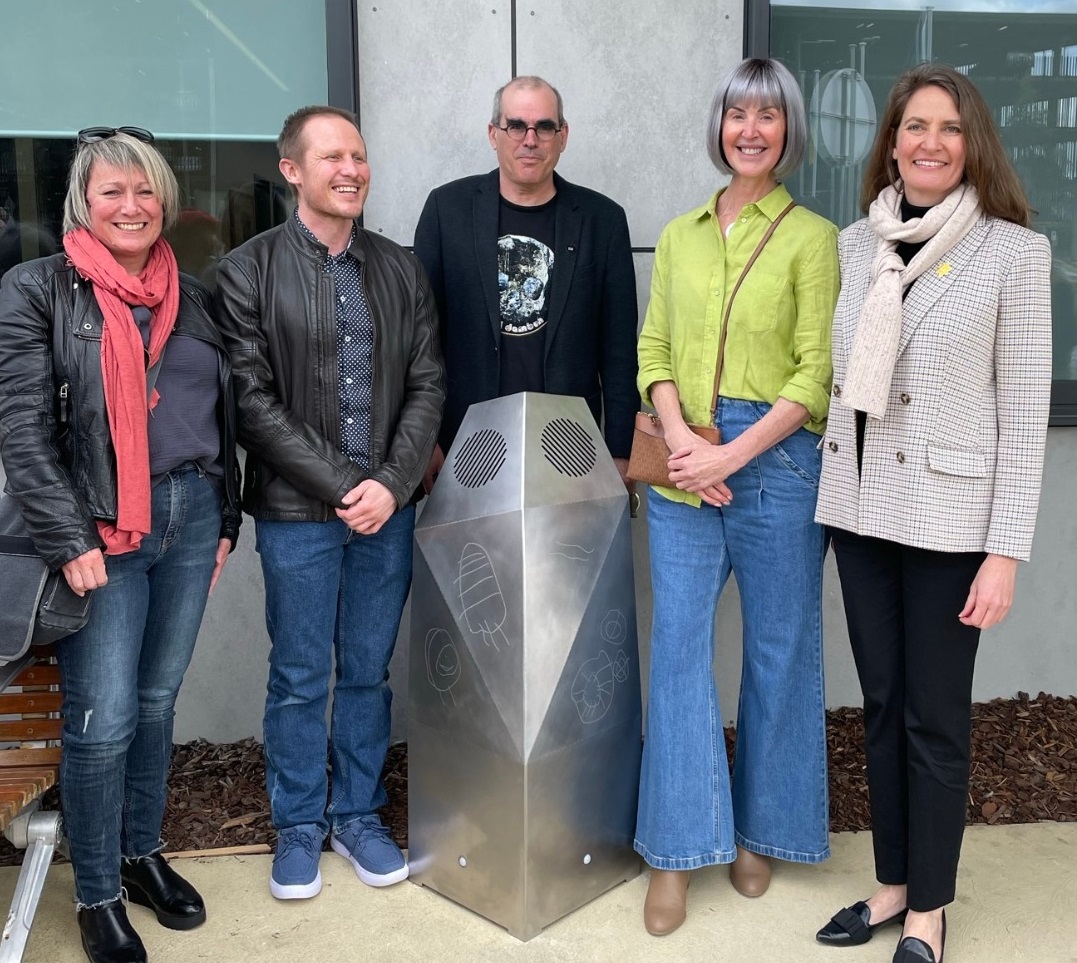
Verity Hawkins (CEO of Cancer Council ACT), Michael Sollis and Canberra Biennial director Neil Hobbs, and immunodeficient Canberrans Sophy Greenwood and Sharon Young. Photo: Cancer Council
Few people expect to be diagnosed with advanced bowel cancer at the age of 35.
In May 2021 a large tumour was discovered deep in my bowel. The cancer had spread, so after it was removed I began chemotherapy (one day before the birth of my second son). I joined tens of thousands of Australians who are immunodeficient, whose bodies don’t have the appropriate ability to fight infections and diseases.
One month later COVID-19 triggered another round of lockdowns. Since then, like many other immunodeficient Australians, I’ve often been trapped at home or hiding behind a mask.
I’m an artist, and despite the challenges I channelled my experiences into positivity. I recently launched Reticulum at the University of Canberra Hospital – a sound sculpture where families affected by immunodeficiency and cancer share their stories of how the pandemic has affected them.
“It’s really scary. I feel it’s just a mental weight that other people don’t have to have,” says one Canberran who features in the work. This is a sentiment shared by many, as catching infections such as COVID-19 can have fatal consequences.
Families and friends also feel isolated as they limit their activities to protect those they love: “My sister wants to be good – and she’s really good so much of the time – but she feels like it’s a weight that she has to carry as well”.
Many of the people I spoke to when developing Reticulum simply remarked, “I feel like I’m just more of a burden”.
Creativity can be powerful advocacy. Sharing these perspectives at the entrance of the University of Canberra Hospital hopefully provides a safe space for those visiting to consider what life may be like for someone who is immunodeficient. Reticulum doesn’t intend to proselytize, but instead provides opportunities for people to hear how the pandemic is still affecting Canberrans today.
Immunodeficiency is an invisible disease, and often sufferers don’t have their voices heard. One of the Canberrans I interviewed said “I was getting a blood test and one of the older ladies struck up a conversation and said ‘oh, can’t wait till this mandate is over. I’m going to get all of these things and I’m going to burn them and do some happy dance’. And I’m thinking, ‘You know what? This is like my safety net’”.
Artistic works can share these voices, hoping that as we find a new normal more people aren’t left behind.
When I installed Reticulum at the hospital, one patient came up to me delighted that she could engage with an artistic work to break the monotony of her day and hear other stories that may reflect her own experience – to know that she isn’t alone.
Reticulum is ultimately optimistic – despite the isolation that people feel, there are always strong bonds that keep people connected.
Reticulum connects these experiences with music inspired by an astronomical discovery that was made in Canberra in 1998: Astronomers once thought the expansion of the universe triggered by the big bang would cease, and that all matter would one day come to an end.
However, in the words of astronomer Fred Watson, “we now know that isn’t the case. The expansion is accelerating. The universe is expanding ever more rapidly. And what that means is that it probably will not have an end, perhaps fading into eternity”.
Despite the challenges that many face, we are all like the stars: no matter how far we drift apart we are eternal and remain connected. For some immunodeficient Australians, the moment when families could hug for the first time in months was cathartic.
In my case, inviting my three-year-old son to make drawings of space-objects to be etched onto the walls of the artwork brought us closer together – I also interviewed him for the work, and he profoundly asked the question “When will the germs go away?”.
Fellow artist Jenni Kemarre Martiniello said, “This work shatters the silence. There are too many silences about what we are afraid to talk about. Cancer is one of those.” COVID-19 is changing our community, and artistic expression can share the stories of those who have been silenced.
Hopefully, this can help us all better understand and listen to each other, so we can positively shape our collective future into a new normal which supports the most vulnerable.
















